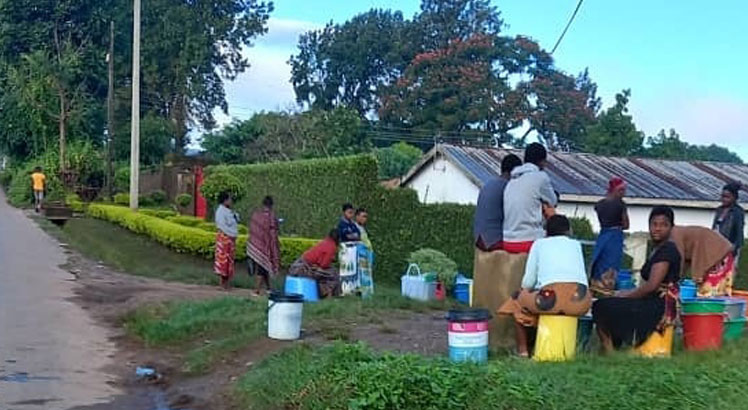Water scarcity threatening cholera fight
The country is facing a serious water challenges with some residents spending more than a week without water raising fears of a possible spike in cholera cases.
All the five water boards in the country are pointing figures at Cyclone Freddy which caused power failure and damaged infrastructure at pumping stations and swept away pipes.
“Central Region Water Board, regrets to inform its valued customers and all stakeholders that they will be experiencing low water pressure or no water situation, due to erratic power supply that has resulted from the prevailing weather conditions,” reads a statement from the utility provider.
Leticia Mpawa from Chilobwe Township in Blantyre said her tap has been dry for seven days and she is forced to drink water from a borehole which is located one and half kilometers from her home.
“The thing is, with these rains the water table is so high, most of the water sources are close to pit latrines and there is a possibility that the water might be contaminated,” she said.

But in contrast, a visit to some of the evacuation centres in Blantyre revealed that the Blantyre Water Board and its partners are providing water through bowsers and that the District Health Office is distributing chlorine in all the centres.
Water Environment and Sanitation Network (Wesnet) executive director Willies Mwandira urged authorities to expeditiously deal with the water and sanitation challenge in evacuation camps especially those that are not privileged with the bowsers.
He further called on the country’s water boards to diversify their energy sources for pumping water, adding that allowing people to drink water from unsafe sources is risky as far as the cholera outbreak is concerned.
“The country is mainly dependent on hydro energy and with the Cyclone, the pumping of water has been a problem as Escom is also affected. Areas hardly hit by the cyclone are the most at risk as the toilets have been washed away together with feces that find their way into water bodies that people are drawing water from. With this, cholera cases might spike again which is worrying as a number of cases are slowing down,” said Mwandira.
Malawi Environmental Health Association (Meha) chairperson Save Kumwenda called on authorities to have a provision for some funds to help in the maintenance of the broken pipes as most of the water boards are already strained.
He said: “Much as we prioritise food, shelter and other needs, there is a need to utilise some of the resources that are coming in following the Cyclone Freddy disaster in maintaining the damaged infrastructure. Even though some DHOs are distributing chlorine, there is still a challenge as most of the people have issues with chlorinated water.”
Kumwenda cautioned that if not handled well, the country will end up using more resources to manage waterborne diseases including cholera.
Minister of Health Khumbize Chiponda on Monday said Cyclone Freddy has increased the risk of some communicable diseases, such as Cholera, Dysentery, Typhoid, Diarrhoea and others.
“Diarrhoeal diseases are mainly spread through faecal-oral route hence poor water and sanitation conditions play an important role in transmission. The displacement of people not only increases the risk of poor water and sanitation but also poor personal hygiene and an increase in vector breeding sites,” she said.
Chiponda urged the public to follow the recommended preventive measures which include washing hands with soap frequently, use of safe water, proper use of toilets and eating food while it is hot among others.
On Monday, the country reported a total of 162 new cases of cholera and two new deaths. The cumulative confirmed cases and deaths reported since the onset of the outbreak in February 2022 is at 54 839 and 1 684 respectively.





